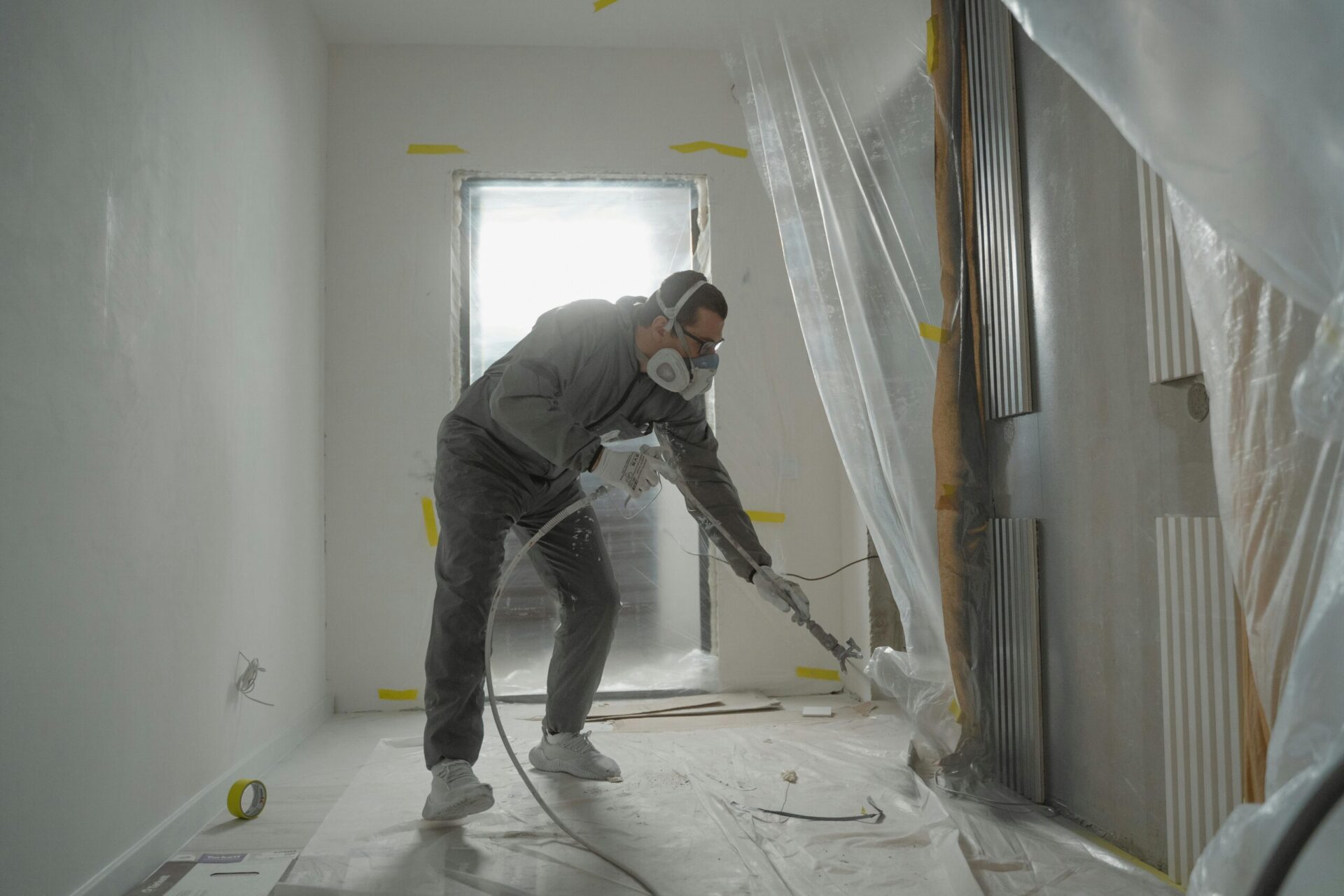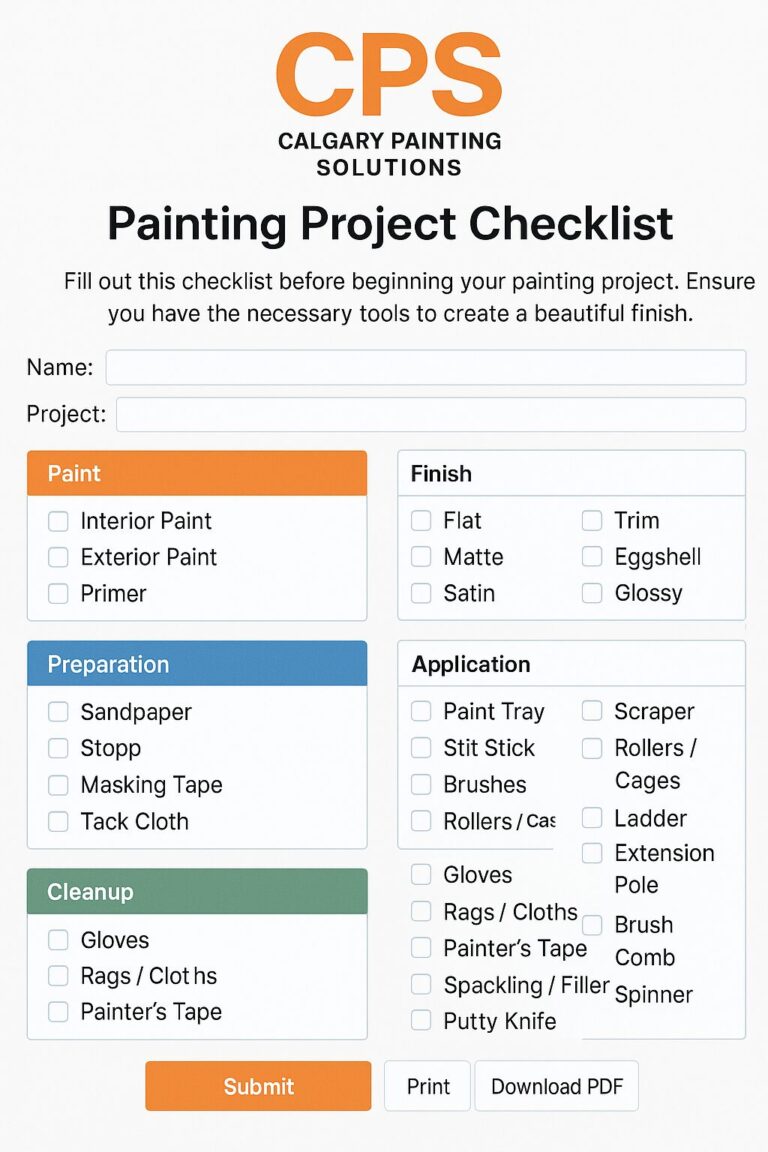7 Questions To Ask Your Local Painting Contractor
We brainstorm 7 essential questions to ask before hiring a local painting contractor to measure quality results and hire the right person for the job
Enhancing your home’s look with a fresh coat of paint can make a world of difference. But landing a local painting contractor who can truly bring your vision to life requires more than just picking a name from the internet. Choosing the right person for the job is crucial and here’s why: a professional paint job doesn’t just improve aesthetics; it can boost your home’s value and curb appeal.
Many homeowners make the mistake of hiring inexperienced local painting contractors, either to save a few bucks or because they didn’t ask the right questions. This often leads to headaches down the line with subpar work, delays, or budget overruns. It’s essential to approach this task with the right information in hand. Doing so helps avoid those unwanted surprises that often crop up with less-competent contractors.
Professional painters bring expertise and thoughtful solutions to the table. They know how to tackle those tricky areas, select the right type of paint or finish for a particular space, and ensure that the final result reflects your style and needs. They mitigate the potential for costly mistakes and reduce frustration during the process. Finding a high-caliber painter hinges on knowing what to ask and look for before inking any deal.
Recognizing how vital the right painter is can save you a lot of trouble. That’s the foundation to getting it right in the first place. You’ll avoid costly mishaps, ensure quality work, and most importantly, you’ll have peace of mind knowing your project is in the right hands.
Verify Licensing and Insurance
 Before hiring any local painting contractor, it’s crucial to check if they’re licensed and insured. Licensing is essentially a stamp of approval that shows the painter meets specific industry standards. It’s a sign they’re qualified to do the job right and have the necessary skills to tackle your project.
Before hiring any local painting contractor, it’s crucial to check if they’re licensed and insured. Licensing is essentially a stamp of approval that shows the painter meets specific industry standards. It’s a sign they’re qualified to do the job right and have the necessary skills to tackle your project.
Insurance is equally important. It acts as a safety net for both you and the painter. Accidents can happen even in the most controlled environments. Without proper insurance, you might find yourself responsible for any mishaps that occur on your property. Always ask to see proof of their current insurance coverage.
When you skip this step, you’re not just taking a gamble on the quality of the work; you’re also leaving yourself exposed to potential financial liabilities. A licensed painter is more likely to follow regulations, which often include adhering to safety standards and work ethics.
Get clear on what type of licenses your local area requires for residential painting. Some places might have more stringent requirements, ensuring only the best make the cut. Also, inquire about general liability insurance and workers’ compensation. The painter should be able to provide documentation that’s easy to verify.
Simply put, by confirming these details upfront, you can avoid future problems and ensure you’re working with a responsible and professional team. This is your first big step in securing a smooth and satisfying painting project.
Assess Experience in Similar Projects
 When you’re eyeing a painting project, not all painters bring the same level of expertise to the table. One local painting contractor might be a whiz at transforming interior spaces, while another excels in outdoor surfaces. Before diving in, ask about their experience with projects like yours.
When you’re eyeing a painting project, not all painters bring the same level of expertise to the table. One local painting contractor might be a whiz at transforming interior spaces, while another excels in outdoor surfaces. Before diving in, ask about their experience with projects like yours.
For instance, if you’re looking at a complex exterior job, you need someone who knows their way around different sidings or can manage tricky surfaces. Experience isn’t just about years in the business; it’s about familiarity with specific project types.
Ask potential painters to walk you through similar jobs they’ve completed. This will give you an insight into their capability to handle any unique challenges your project might present. A well-versed painter will have no qualms sharing their past successes without hesitation.
Understanding their background helps you set the right expectations from the get-go. It’s not about just getting someone who can paint; it’s about finding someone who can deliver top-notch results tuned to your needs.
Their past experiences can reassure you about their problem-solving skills, which can be crucial when facing unexpected issues. It’s also a good way to get a sense of their adaptability when things need a bit of tweaking.
Review References and Past Work
 Checking out a painter’s work history can tell you loads about their capabilities and reliability. One of the simplest ways to do this is by asking for references or examples of their past projects.
Checking out a painter’s work history can tell you loads about their capabilities and reliability. One of the simplest ways to do this is by asking for references or examples of their past projects.
When you’re handed a portfolio, take a close look. Is their work neat? Do the details align with what you envision for your own space? Seeing their previous projects can give you a visual understanding of their skills and attention to detail.
References are another powerful tool. They provide insights into the painter’s professionalism, punctuality, and the quality of their work. Try reaching out to a few past clients if possible. Ask them about their overall satisfaction, how the painter handled any hiccups, and whether they’d hire them again.
A good portfolio backed by strong references is a reliable indicator of the painter’s past success and future potential in delivering on their promises. Don’t hesitate to delve into these resources—your home deserves nothing less than assured quality.
Guidance on Choosing Paint and Finish
 Selecting the right paint and finish is a game-changer for any painting project. Whether you’re aiming for a dramatic effect or a subtle enhancement, it’s crucial to lean on your painter’s expertise.
Selecting the right paint and finish is a game-changer for any painting project. Whether you’re aiming for a dramatic effect or a subtle enhancement, it’s crucial to lean on your painter’s expertise.
A knowledgeable local painting contractor isn’t just there to slap paint on walls; they should guide you through the maze of choices. This includes understanding which paint type works best for specific rooms or conditions. For instance, kitchens and bathrooms might require moisture-resistant finishes, while living areas could benefit from a more aesthetic approach.
Colors and finishes can significantly affect your home’s vibe and even its resale value. Skilled painters know how various shades interact with lighting and match with existing furnishings. They can suggest options that elevate the look or feel of your space while ensuring longevity.
Don’t shy away from asking for samples of colors and finishes, along with professional opinions on their selection. This helps you visualize the end result and ensure it aligns with your expectations.
By tapping into their advice, you’ll not only achieve a stunning visual impact but also ensure that your paint job withstands the test of time.
Demand a Detailed Written Estimate
 Before any painter picks up a brush, having a clear, written estimate is essential. This isn’t just a piece of paper; it’s your safeguard against unexpected costs and miscommunications.
Before any painter picks up a brush, having a clear, written estimate is essential. This isn’t just a piece of paper; it’s your safeguard against unexpected costs and miscommunications.
A solid estimate should break down all the costs involved—labor, materials, and any additional charges that could pop up. It gives you a clear picture of where your money’s going. If any item seems vague, ask for clarification. Don’t leave room for surprises on the final bill.
Beyond costs, an estimate should outline the scope of the work. This includes any prep work, the number of coats, and the cleanup process. This way, both you and the painter are on the same page about what’s included in the service.
When you’ve got a detailed estimate, it also enables you to compare quotes from multiple painters. Look out for significant differences in line items as they might indicate corners being cut or unnecessary upsells.
Having everything documented not only helps in budgeting but also sets the groundwork for a smooth professional relationship with your painter. It aligns expectations and helps avoid disputes once the job is underway.
Inquire About Warranties Offered
 Before you commit to a local painting contractor, it’s wise to understand the warranties they provide for their work. These aren’t just promises; warranties act as your safety net, ensuring that you’re covered if things don’t pan out as expected.
Before you commit to a local painting contractor, it’s wise to understand the warranties they provide for their work. These aren’t just promises; warranties act as your safety net, ensuring that you’re covered if things don’t pan out as expected.
Ask specifically about the warranties on both the workmanship and the materials used. Workmanship warranties cover the quality of the job itself—essentially guaranteeing that the finish won’t peel or crack prematurely. Material warranties, on the other hand, usually cover the lifespan of the paint as guaranteed by the manufacturer.
Clarity here is key. Spend some time going through the details with your painter. How long are these warranties valid? What specific conditions or damages do they cover? This helps you gauge the degree of responsibility and confidence the painter has in their work.
A robust warranty can highlight a painter’s commitment to quality, showing they’re ready to stand by their service. If a painter offers extensive warranties, it’s often a sign of good craftsmanship and professional integrity.
So when you’re wrapping up discussions, make sure any warranty information provided is included in the contract. This ensures you’ve got documented proof should any issues arise down the line.
Clarify Project Timeline and Cleanup Process
 Having a clear timeline for your painting project is crucial. It helps you plan around the work being done and ensures that the painter is organized and realistic about their schedule. Start by asking the local painting contractor how long they expect the project to take. Discuss any factors that might impact this timeline, such as weather for exterior work or the availability of specific materials.
Having a clear timeline for your painting project is crucial. It helps you plan around the work being done and ensures that the painter is organized and realistic about their schedule. Start by asking the local painting contractor how long they expect the project to take. Discuss any factors that might impact this timeline, such as weather for exterior work or the availability of specific materials.
Transparency here is important. Make sure the timeline includes stages of the project, from preparation and color testing to the actual painting and drying time. Knowing this schedule allows you to accommodate any necessary preparations on your end, such as relocating furniture or scheduling other renovations.
Equally important is understanding how the painter plans to handle the cleanup once the job is done. A thorough cleanup is a mark of professionalism and shows respect for your property. Inquire about the steps they’ll take to tidy up the site, remove paint debris, and dispose of any hazardous materials correctly.
Discussing these elements upfront helps to eliminate any assumptions and align expectations. It ensures that the project wraps up smoothly, with your space returned to you in tidy condition, ready for enjoyment.


I recently heard this person complaining about the terrible pain job she got and looking for another painter to fix the job. It’s unbelievable how often this happens. What’s the best way to verify contractors?
The best way to ensure quality and reliability is by following the tips here. The easiest option is to use a third-party service like Contr, where contractors have already been thoroughly screened. This approach is ideal because everything is managed in-house with high standards. You could try other platforms, but keep in mind that they are often automated and may not offer the same level of quality control. Check out Contr for a more trusted experience: https://contr.ca/